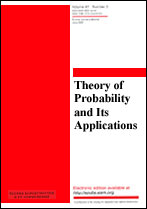|
On a functional version of the convergence of a quadratic form in independent martingales to a $\chi^2$ distribution
B. Cadre
IRMAR, Universitè de Rennes I, France
Abstract:
Let $(a_{ij})_{i,j\ge 1}$ be an infinite matrix of real numbers such that $a_{ii}=0$, $i\ge 1$ and let $(X^i)_{i\ge 1}$ be a sequence of independent martingales such that $\sup_{i\ge1}\mathsf{E}[(X_1^i)^4]<\infty$ and for each $i\ge 1$ the predictable compensator of the quadratic variation of $X^i$ is the identity function. If for each $n\ge 1$, $\sigma_n^2=\sum^n_{i,j=1}a^2_{ij}$ we give a necessary and sufficient condition so that the process defined for each $n\ge 1$ and $t\ge 1$, by $\sigma_n^{-1}\sum_{i<j\le n}a_{ij}X_t^iX^j_t$ converges in law to $((2\sqrt{p})^{-1}\sum_{i=1}^p((B_t^i)^2-t))_{t\le1}$, where $p\ge 1$ and $B^1,\dots,B^p$ are $p$ independent standard Brownian motions. We then study the case where $(X^i)_{i\ge 1}$ is a sequence of independent solutions to the ‘`Structure Equation.’
Keywords:
quadratic forms, $\chi^2$ distributions, functional limit theorems, martingales, stochastic calculus, Brownian motion.
Received: 11.11.1996
Citation:
B. Cadre, “On a functional version of the convergence of a quadratic form in independent martingales to a $\chi^2$ distribution”, Teor. Veroyatnost. i Primenen., 43:1 (1998), 82–96; Theory Probab. Appl., 43:1 (1999), 13–25
Linking options:
https://www.mathnet.ru/eng/tvp825https://doi.org/10.4213/tvp825 https://www.mathnet.ru/eng/tvp/v43/i1/p82
|


|




 Contact us:
Contact us: Terms of Use
Terms of Use
 Registration to the website
Registration to the website Logotypes
Logotypes








 Citation in format
Citation in format 